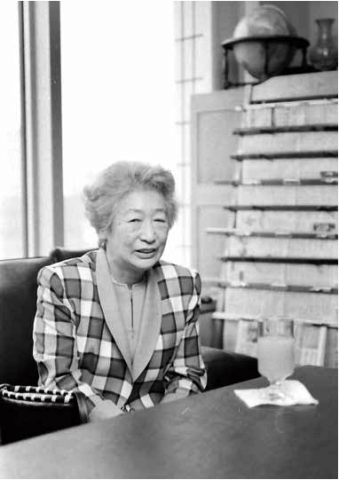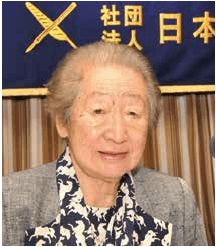Issue:
Sadako Ogata

As well as being a member, Sadako Ogawa appeared many times at the FCCJ. On this page, in 1992 before a press conference when she was with the UNHCR; opposite, in 2013, as chairperson of the World Economic Forum, Japan
A DEFINING CHARACTERISTIC of FCCJ Associate Member Sadako Ogata, who passed away in October at the age of 92, was her simple and sincere humanity, particularly manifested in her work with international refugees. Along with the compassion and care she displayed went a fiercely egalitarian attitude toward the role and status of women in society.
She was a role model for women in Japan, where male dominance has long been accepted as part of the natural order of things. She led by example rather than exhortation, by simply getting on with the job.
She was, like her late husband Shijuro Ogata (also an FCCJ member), a self deprecating person, yet able to project an aura of authority and quiet competence. They both could “walk with princes and with commoners,” and they did in her case with figures at the highest levels of diplomacy; in his, with the most senior figures in international finance.
A front page photograph accompanying the Japan Times’ report of Mrs. Ogata’s passing showed a tearful Bosnian refugee woman embracing her during her lengthy period as head of the United Nations High Commission on Refugees (UNHCR). She had strength that enabled her to remain calm and collected in the face of strife. Machiko Kondo, wife of FCCJ Board member Robert Whiting and a retired senior UNHCR official who worked closely with Mrs. Ogata, recalls her being asked by a reporter during a visit to a region suffering a severe refugee crisis whether she ever became emotional at seeing the difficulties that refugees faced.
“I cannot go around with tears in my eyes” was her response. “I have a lot of work to do.” She went on showing exemplary devotion to duty at a time of life when many people believe they have earned retirement and rest.
When I profiled her for the Singapore Business Times in 2013 she was still a commanding presence at 86.
Mrs. Ogata had a relationship with the United Nations spanning more than 30 years, including being appointed as UN High Commissioner for Refugees from 1991 to 2000, then co-chair of the Commission on Human Security, and then chairperson of the UNICEF Executive Board. From 2003 to 2012 she was head of the Japan International Cooperation Agency (JICA).
That career began in the late 1960s, when she was a lecturer in international relations at the International Christian University in Tokyo. She was asked if she would join the Japanese delegation to the United Nations General Assembly in New York. Mrs. Ogata hesitated to take the UN opening, as her career until then had been as an academic. After graduating from the University of the Sacred Heart in Japan she had obtained a Masters in international relations at Georgetown University in Washington and then a PhD in political science at the University of California, Berkeley. She also had two young children at the time.
“There was a big family discussion and it took a little time,” she told me. “But my father [former diplomat Toyokazu Nakamura] told me, ‘Your grandfather and grandmother will take care of all that. You go.’ I had studied at Georgetown University and had my Master’s already, so going to the United States was not something new. But being married and with children it was a big difference.” Mrs. Ogata duly left for New York, leaving her husband, son and daughter behind. That initial two month stint on the Japanese delegation began her long devotion to official duty.
FCCJ Regular Member Haruko Watanabe says that she was the first female Japanese journalist to cover Mrs. Ogata in New York when she was appointed Japan’s first female UN minister. “Mrs. Ogata,” she says, “convinced me to keep working in journalism rather than limiting myself to academic research. The result is that I am the simple and happy ‘Harukosan,‘Dr. Watanabe.’”
Guiding other people along their career paths seems to have been one of Sadako Ogata’s gifts. Sachiko Sakamaki, another journalist and former Regular Member of the FCCJ, remembers that, “Mrs. Ogata was someone who inspired me when I was in college to do work related to international affairs.” There are numerous such examples.
While Ogata is well remembered at the FCCJ for the 10 occasions on which she gave press conferences at the Club in her roles for the UNHCR and JICA, Club Members recall other aspects that were displayed during her long association with the FCCJ. Former FCCJ president Kaz Abiko told me that Mrs. Ogata “loved tennis.” “She used to come to the Tokyo Lawn Tennis Club regularly on weekends,” he recalled. “After I joined the Club in 2006, we occasionally played together.”
Mrs. Ogata, a former All Japan Tennis Championships player, learned the sport as a child from her diplomat father. Says Abiko, “When she was a student at the University of the Sacred Heart, she successfully lobbied the university to build two tennis courts on its campus, and she helped organize the tennis team. Empress Emerita Michiko, another Sacred Heart graduate, was another of her tennis friends.”
“She was about 80 years old when I was playing, so that she could not move fast on the court,” says Abiko. “But I was impressed by her steady ground strokes. I still remember her beaming smile when we won a mixed doubles match against fellow Club members.”
Prime Minister Junichiro Koizumi once offered Sadako Ogata a government position. Her husband Shijuru told me in a conversation before his passing in 2014 that Koizumi once called him to ask whether it was acceptable to offer Mrs. Ogata the post of minister of foreign affairs. “Why don’t you ask my wife,” Mr. Ogata responded, rejecting the idea that it was a husband’s prerogative to decide such matters. In the end, she turned down the position, but did become an advisor to the minister of foreign affairs.
Mrs. Ogata came from an elite family. She was the great granddaughter of Inukai Tsuyoshi, who was prime minister of Japan in the 1930s. Her grandfather, Yoshizawa

PM Junichiro Koizumi once called her husband to ask whether it was acceptable to offer Mrs. Ogata the post of minister of foreign affairs. “Why don’t you ask my wife?” Mr. Ogata responded
Kenkichi, was a Japanese foreign minister and her father a diplomat who insisted that Ogata maintain her English lessons wherever the family went. Hence her spoken English was of a quality that could put many native speakers of their language to shame.
She was strongly aware of the need to protect human dignity even among refugees. “Refugee work is not just about charity or protection [of people],” she told me. “It is really about the relationship between state and society.” She was at the height of her career at a time when what she called the “disintegration of states” became a major threat to human security. The former Soviet Union, Ukraine, Yugoslavia were all federated states that disintegrated. Citizens were turned into refugees. In Africa, too, she said, countries became independent and were expected to protect their own citizens, so there were many refugee protection issues. Citizens were no longer under the cover of former empires. They had to be protected by their own new state and there is inevitable conflict. “Those were the times when there was a lot of fighting, a lot of persecution and death,” said Mrs. Ogata. “I worked very hard at that time.” In recognition of her work, Russian president Vladimir Putin awarded Ogata the Order of Friendship of Russia in 2001 (one of many foreign decorations she has received).
Did she think that the value of the work she and others did with refugees had been fully recognized? “It will need a lot of work to put the principles and the regulations in the Refugee Convention into practice,” she said. “There is a whole lot of refugee related international law [to be enacted], particularly with regard to internally displaced persons.”
Ogata was as passionate about the role of women in society as she was about the welfare of refugees. When I suggested that women appeared to be achieving greater professional success and recognition now in Japan, she responded smartly (and also a little tartly): “It’s about time. In terms of education, [the system in Japan] is fully open to women. There are certainly professions in which women are doing very well such as in the areas of medicine, finance and local politics,” she said.
Many Japanese women are “quite emancipated,” she said. “I think what kept them behind were child welfare arrangements.” The education system in Japan is not a problem. It’s the health and welfare part that was not sufficient. In the past, kindergartens and nurseries were under different government ministries, and that made it very difficult for mothers. . . . That has been changed and mothers have more [free time now].”
I asked Mrs. Ogata what advice she would offer to young Japanese women who are about to start climbing the career ladder? “Carry on,” she replied. “Try to do whatever you want to do.” That could be a fitting epitaph for a woman who was an inspiration to so many others.
– Anthony Rowley
Anthony Rowley is a former president and first vice president of the FCCJ. During a long career in journalism he has worked as Business Editor and International Finance Editor of the Far Easten Economic Review and prior to that on the Times of London. He is the author of several books.

